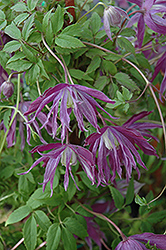Height: 10 feet
Spread: 24 inches
Sunlight:
![]()
![]()
Hardiness Zone: 3a
Other Names: Large-petalled Clematis
Group/Class: Atragene
Description:
One of the hardiest of all clematis and a vigorous grower, covered in small violet flowers in late spring, one of the most durable climbers for the toughest situations
Ornamental Features
Jan Lindmark Clematis features delicate nodding violet bell-shaped flowers at the ends of the branches from mid to late spring. It has green deciduous foliage. The pointy compound leaves do not develop any appreciable fall colour.
Landscape Attributes
Jan Lindmark Clematis is a multi-stemmed deciduous woody vine with a twining and trailing habit of growth. Its average texture blends into the landscape, but can be balanced by one or two finer or coarser trees or shrubs for an effective composition.
This is a relatively low maintenance woody vine. It is a Type 1 clematis, meaning that it flowers on old wood of the previous season; other than trimming off obvious dieback in spring, it should only be pruned where necessary immediately after flowering. It is a good choice for attracting bees and hummingbirds to your yard. It has no significant negative characteristics.
Jan Lindmark Clematis is recommended for the following landscape applications;
- Accent
- Hedges/Screening
- General Garden Use
Planting & Growing
Jan Lindmark Clematis will grow to be about 10 feet tall at maturity, with a spread of 24 inches. As a climbing vine, it tends to be leggy near the base and should be underplanted with low-growing facer plants. It should be planted near a fence, trellis or other landscape structure where it can be trained to grow upwards on it, or allowed to trail off a retaining wall or slope. It grows at a medium rate, and under ideal conditions can be expected to live for approximately 20 years.
This woody vine does best in full sun to partial shade. It does best in average to evenly moist conditions, but will not tolerate standing water. It is not particular as to soil type or pH. It is somewhat tolerant of urban pollution. Consider applying a thick mulch around the root zone in both summer and winter to conserve soil moisture and protect it in exposed locations or colder microclimates. This is a selected variety of a species not originally from North America.
Disclaimer - This resource is provided for informational purposes only and does NOT reflect current availability. Inventory varies seasonally, so we cannot guarantee that every plant will be in stock at all times - please contact your favourite GardenWorks location directly for current availability. It does not include our entire inventory of plants, so be sure to visit GardenWorks to see varieties that may not be represented on this list.

